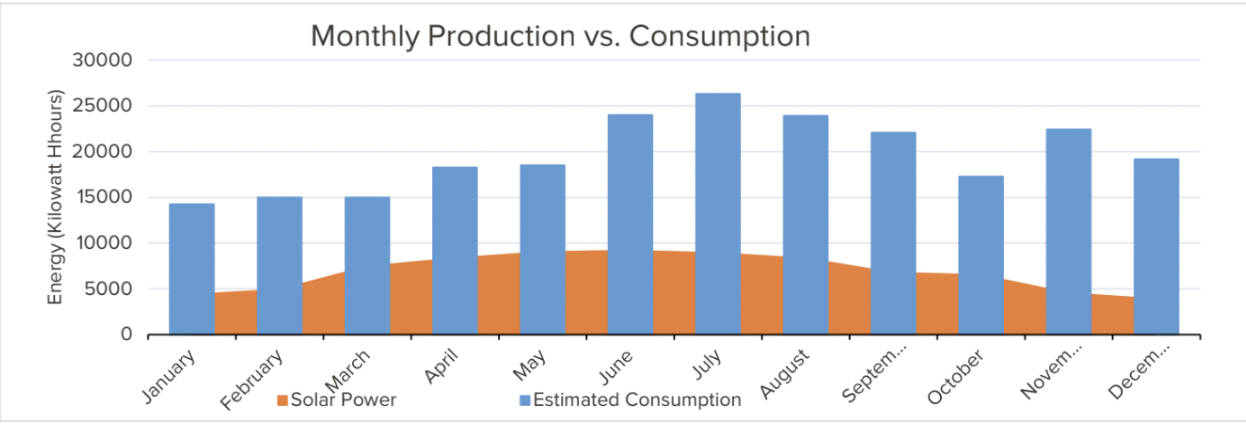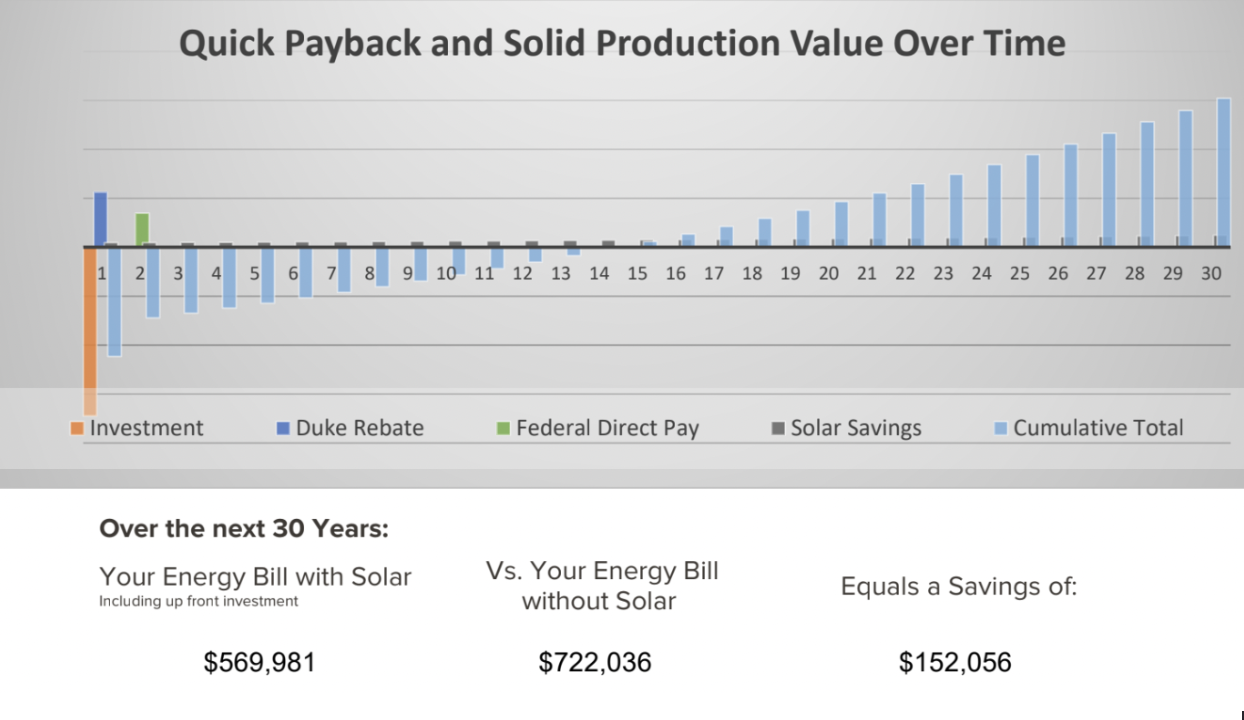117 MWh from a 76 kW in 18 Months: What Solar Has Already Delivered for the Asheville JCC
Executive Summary
At the Asheville Jewish Community Center (JCC), sustainability has always been more than just a buzzword. The center has long been committed to environmental stewardship and community well-being. With a growing desire to reduce their carbon footprint and model eco-conscious practices, they decided it was time to make a significant change: transitioning to solar energy. In our interview with Ashley Lasher, the Executive Director of the Asheville Asheville JCC, she shared that the center was founded in 1940 to help build a community for Jewish people, and that solar fits into a “Jewish tradition, “tikkun olam, which means repair of the world.” She goes on to say that “adding solar to our facility is a very real way of living into that value. By allowing us to power our community center with clean energy, we're taking a small step towards practicing tikkun olam. Our tradition teaches us that you are not required to complete the work, but neither are you free to desist from it. So by adding solar, we are building a cleaner, brighter future for our community and our kiddos.”
The Asheville Jewish Community Center (JCC) partnered with Sugar Hollow Solar to install a 76.3 kW solar system atop their facility just outside of downtown Asheville. Within the first 18 months, the system produced over 117 MWh, offsetting carbon emissions equal to 1,384 trees planted and 91,735 pounds of coal avoided.
Project Background
Founded in 1940 as a cultural and communal hub for Asheville’s Jewish population, the Jewish Community Center (JCC) has evolved into a vibrant center for early childhood education, Jewish celebration, and inclusive community engagement. Executive Director Ashley Lasher shared that the center’s environmental values are deeply rooted in Jewish tradition, noting:
“Our tradition teaches us that you are not required to complete the work, but neither are you free to desist from it. Adding solar is a very real way of living into that value.”
In 2023, the JCC identified solar as a strategic opportunity to model sustainability while also managing long-term energy costs. The decision was guided by both practical and idealistic goals: to reduce operational expenses and to lead by example in environmental responsibility.
After exploring several potential providers, the JCC selected Sugar Hollow Solar for their expertise, transparent planning process, and alignment with the center’s mission and values.
Solution Details
System Size: 76.3 kW
Panel Type: 159 Hanwha QCell 480 panels
Commissioned: December 5, 2023
Installer: Sugar Hollow Solar
Location: Asheville, NC
In December 2023, the JCC commissioned a 76.3 kW solar system composed of 159 Hanwha QCell 480 panels. Designed and installed by Sugar Hollow Solar, the project was completed at the JCC’s Asheville campus with careful consideration of the center’s unique operational needs, including its outdoor-focused early childhood education program and regular community events.
The JCC selected Sugar Hollow Solar after evaluating several providers. Key to their decision was the company’s reputation for creating customized solar solutions, clear and collaborative communication, and a strong alignment with mission-driven organizations.
Ashley Lasher, Executive Director of the JCC, reflected on the experience:
“From start to end, working with Sugar Hollow has been very seamless. They were professional, communicative—even at times when things were hectic or crazy on our end. They kept us on track and on timeline, making the process really smooth. Fantastic. And that was awesome. And finally, this is a center and a community that is primarily based around helping with early childhood education.”
Measurable Results (as of July 2025)
The transition to solar has been transformative for the Asheville JCC on multiple levels. Financially, the center has seen a substantial reduction in energy costs, saving over $20,000 in utility bills, helping to stabilize their budget and allowing resources to be directed toward community programs. Environmentally, the solar array has significantly reduced the JCC’s carbon footprint, offsetting emissions equivalent to powering 18 homes annually and avoiding over 107,495 pounds of coal emissions as of July 2025.
Beyond the numbers, the solar installation has become a living teaching tool. The JCC integrates lessons on solar energy and clean power into their early childhood education programs, complementing existing teachings about the environment, Jewish values, and the cycles of nature. Their garden, aligned with Jewish seasons and traditions, serves as an interactive classroom where children learn about stewardship and sustainability firsthand. This hands-on approach fosters a deeper connection to the natural world and responsibility for its future—values that reflect the JCC’s commitment to tikkun olam, or “repair of the world.”
The solar project has also inspired other local organizations to pursue renewable energy solutions, reinforcing the JCC’s role as a community leader in environmental stewardship.
Lifetime Production as of July 2025: 137.21 MWh
Carbon Offset Equivalents:
1,621 trees planted (10-year growth equivalent)
21 passenger vehicles taken off the road (1 year)
18 homes powered annually
107,495 Lbs. of coal emissions avoided
Financial ROI
Payback Period: Estimated 6–7 years
Projected Offset Window: 17–18 years of free, clean energy after ROI
Incentives:
Federal ITC (Investment Tax Credit): 30%
MACRS Accelerated Depreciation: Applicable for nonprofit affiliates via third-party ownership models (consulted separately)
Strategic Goals Met
The Asheville Jewish Community Center’s solar project achieved more than just energy savings—it embodied the center’s broader vision and values in tangible ways.
Demonstrating Environmental Leadership: By investing in a sizable 76.3 kW solar system, the JCC positioned itself as a pioneer among local nonprofits and educational institutions. Their visible commitment to clean energy sparked conversations throughout the community about sustainability and responsible stewardship, encouraging peer organizations to consider similar investments.
Reducing Operational Costs: The significant decrease in electricity expenses has strengthened the JCC’s financial stability, allowing more funds to be channeled directly into vital programs. This practical benefit ensures the center can continue offering quality services without compromising its mission.
Enhancing Mission Alignment: Rooted in the Jewish value of tikkun olam—the call to repair and care for the world—the solar installation serves as an infrastructure decision that reflects and amplifies the JCC’s core beliefs. This alignment between values and operations deepens the authenticity of their environmental commitment, making sustainability an integral part of their identity.
Serving as an Educational Catalyst: The solar system is woven into the daily learning experience for children, who engage with lessons on energy, ecology, and responsibility. Coupled with their seasonal garden, these hands-on opportunities nurture curiosity and a sense of accountability toward the planet, cultivating the next generation of environmental stewards.
Inspiring Community Resilience: Beyond their own campus, the JCC’s leadership in adopting renewable energy has sparked broader conversations about climate responsibility and resilience in Asheville. Their example highlights how organizations can take meaningful action to prepare for and mitigate the impacts of environmental change, strengthening community bonds around shared values.
Testimonial
“We celebrated Tu B’Shevat, the Jewish holiday honoring trees, shortly after installing, by sharing that our solar system had already offset the equivalent of planting 50 trees. It felt deeply meaningful. Our kids play outside every day and grow a garden that aligns with the Jewish agricultural calendar. Now, we’re teaching them about clean energy, too. That’s a future we want to invest in.”
— Ashley Lasher, Executive Director, Asheville JCC



